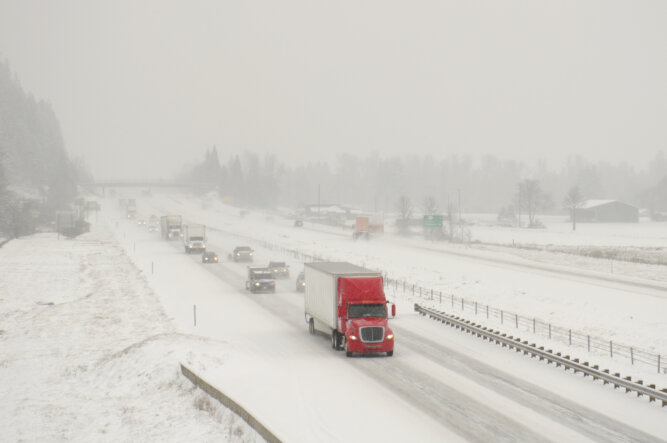What You Need To Know About Winter Weather Trucking Essentials

Find your next load
Make more money starting now.
The transportation industry never sleeps, no matter the weather. But frequent snow storms and inclement weather, particularly in areas like the Northeast, Midwest, and the Rock Mountains, should be on every trucker’s radar from November to April.
If you’ll be driving routes through winter weather this season, prepare your winter weather driving essentials now. We’ve pulled together a thorough list of supplies for both inside and outside the truck, tips on driving in bad conditions, and what to do if you get stuck.
Essential Supplies for Inside Your Truck
If you get stuck, there always seems to be something you forgot or wished you had. Use this list to ensure you have what you need to stay warm and safe on the side of the road.
- Warm clothing and extra blankets. Pack some layers of clothing in your truck (think lightweight thermals and coats), extra socks, gloves, a winter hat, and at least one cozy blanket for when the need arises. You should also keep a pair of boots that will keep your feet dry and warm should you need to get out of the truck in snow or ice.
- Non-perishable food and water. Keep a stash of water bottles or gallon jugs in your truck. Tuck them under the seat or find a good place to keep them in your berth. Here are some tips for food to keep:
- Dried fruit like raisins, apricots, and dates
- Nuts. Choose your favorite kind (unsalted if possible), as they are a good source of protein
- Peanut butter
- Your favorite granola bars
- Energy bars or chews
- Jerky or canned tuna, chicken, or turkey
- Portable heating devices and fuel. You can find plug-in blankets, small electric heaters, or handheld propane heaters that can fit in your cup holder. If you’re in a situation where you’re camping overnight in your truck, make sure you have a backup heat source. It’s also a good idea to keep air-activated hand and toe warmers.
- Personal hygiene items and medications. You should always have deodorant, a toothbrush, some toothpaste, and extra glasses or contacts stashed in your truck. If you are on any medications, it’s a good idea to take those along with you, too, in case you end up stranded for a day or two or can’t get a prescription filled on time.
- First aid kit. It’s important to have medical supplies in case of an emergency, especially in winter. Make sure it’s fully stocked and be sure to include things like pain medications or other over-the-counter medicines you might need.
- Emergency communication tools. You likely rely on your mobile phone for things like navigation, communication, and finding the next rest stop. But what happens when there’s no service, or you can’t charge your device?
Here are some ideas to keep you safe and prepared:
- Portable cell phone battery
- Cell phone booster kit
- HAM radio
- Satellite phone
- Road atlas
- Personal locator beacon or satellite messenger
Many of these items can be kept in a backpack underneath your seat or stowed safely in your berth. Get them together before winter hits, so you’re prepared for any situation.
Equipping the Outside Your Truck
Don’t get caught unprepared—gather the supplies you might need if your truck gets stuck or needs repairs during the winter. Here’s what we suggest gathering:
- Snow chains or tire socks. Make sure your truck has these before you leave.
- Shovel and ice scraper. For your windows or for moving snow around your wheels.
- Cat litter or sand for traction. Grab a pack of cheap litter from your local supermarket. It makes a world of difference if you get stuck on ice.
- Emergency flares or reflective triangles. You should always have these in your emergency kit, but double-check before winter comes.
- Extra fluids and additives. Windshield wiper fluid, diesel additives, and antifreeze are all good to have in a pinch.
- Basic tools for minor repairs. You can find small tool kits at the hardware store that take up little space but make a big difference in an emergency. Be sure to also include a flashlight, jumper cables, and extra batteries.
How to Stay Safe if You Get Stuck on the Road
With the risk of icy roads, snowy conditions, or low visibility creating hazardous driving conditions, it’s likely at some point in your driving career you’ll find yourself stuck in unfavorable circumstances. To stay safe, there are a few key things to remember.
- Don’t abandon your truck unless absolutely necessary. Stay inside if you can. You’ll be so much safer if you do!
- Keep the exhaust pipe clear of snow to prevent carbon monoxide poisoning. Hop out once in a while and give your truck a quick once over.
- Run the engine periodically for heat, while still conserving fuel. You don’t want to be out of fuel once the conditions improve, but be sure you run your engine once in a while to keep warm.
- Keep in contact with dispatch and emergency services. Communicate regularly while still conserving your battery life. Use your emergency communication devices if needed.
- Signal for help using reflective materials and lights. If you’re stuck, ask for help. There are plenty of other truckers on the road who’ve been there and will help you out.
- Don’t try to drive until conditions improve. The weather may put you behind schedule, but an accident can result in more delays and out-of-pocket expenses. Don’t attempt to get back on the road until it’s safe.
If you get stuck, remember not to panic. This winter weather won’t last forever. If you’re prepared, inside and outside your truck, you’ll be surprised at how long you’ll be comfortable and warm.
Tips if You’re Stranded for Multiple Nights
If you’re stranded for a few days, these tips will keep calm and safe.
- Ration food and water supplies. Drink little sips and eat one or two snacks to keep the edge off your hunger. Try to regulate what you eat and how often.
- Create a temporary shelter within the truck. As previously mentioned, stay in your truck if you can. Use your blanket, extra clothing, heat source, and communication devices to stay in contact with emergency services the whole time.
- Monitor weather updates and road clearing progress. While you’re in touch with emergency dispatch, be sure to ask what is being done to clear the roads. Hearing updates will help give you an idea of what to expect and how long to plan to be stopped.
- Maintain a positive mindset and focus on safety. Your safety is the number one priority. Do what you need to to stay warm and hydrated. Be prepared for when your cell phone loses service.
Prepare Now—Avoid Worries Later
Taking precautions and making preparations ahead of time can feel like a hassle—until you’re in an emergency situation. Winter weather is going to happen. You’re going to get caught in the snow. The real difference is, how prepared are you for when it happens?
Take time now to go over your emergency supplies, perform a truck maintenance check, and you’ll find that you’re ready for just about anything. Keep up to date with Truckstop.com for tips and tricks for driving in any weather.

Find out how our platform gives you the visibility you need to get more done.
Get helpful content delivered to your inbox.
Schedule a demo.
Find out how our platform gives you the visibility you need to get more done.





